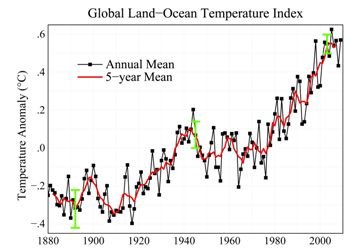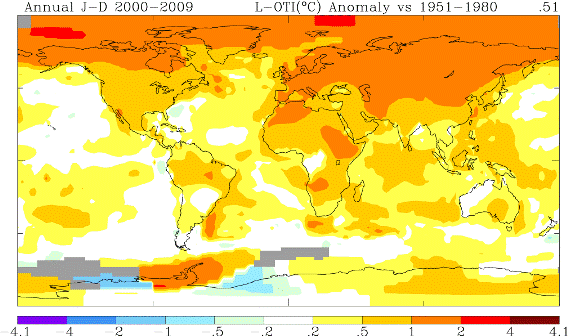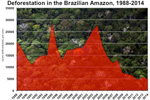Science behind climate change remains robust, according to researchers.
Signed by 255 members of the National Academy of Science, a new letter in the journal Science expresses that researchers are “deeply disturbed” by the rancor toward them from some in media and politics. Furthermore the letter outlines, once again, that the science of climate change is based on “compelling, comprehensive, and consistent objective evidence that humans are changing the climate in ways that threaten our societies and the ecosystems on which we depend.”
The scientists add that “recent assaults on climate science and, more disturbingly, on climate scientists by climate change deniers are typically by special interests or dogma, not by an honest effort to provide an alternative theory that credibly satisfies the evidence.”
In addition, the over two-hundred scientists signing the letter called for an immediate end to the “McCarthylike threats of criminal prosecution against our colleagues based on innuendo and guilt by association, the harassment of scientists by politicians seeking distractions to avoid taking action, and the outright lies being spread about them.”
 Except for a leveling off between the 1940s and 1970s, Earth’s surface temperatures have increased since 1880. The last decade has brought the temperatures to the highest levels ever recorded. The graph shows global annual surface temperatures relative to 1951-1980 mean temperatures. As shown by the red line, long-term trends are more apparent when temperatures are averaged over a five year period. Image credit: NASA/GISS. |
Comparing the science of climate change to other “well-established theories”, such as evolution, the big bang theory, and the age of the Earth, the researchers—including 11 Nobel Prize laureates—explain that “there is always some uncertainty associated with scientific conclusions; science never absolutely proves anything. When someone says that society should wait until scientists are absolutely certain before taking any action, it is the same as saying society should never take action.”
The letter is in reaction to a particularly difficult year for climate researchers including impolitic but private emails stolen from a climate research center, the revelation of a mistake on melting glaciers in the Himalayas in the Intergovernmental Panel on Climate Change (IPCC) report, and a controversy about the Amazon and climate change that proved to be much ado about nothing.
“Like all human beings, scientists make mistakes,” the letter writers admit, “but the scientific process is designed to find and correct them. This process is inherently adversarial—scientists build reputations and gain recognition not only for supporting conventional wisdom, but even more so for demonstrating that the scientific consensus is wrong and that there is a better explanation.”
To date no scientist has provided a better explanation for changes occurring worldwide—from earlier spring to migrating species to melting glacier—than anthropogenic climate change. After recording decades of rising temperatures, the letter stresses that “there is nothing remotely identified in the recent events that changes the fundamental conclusions about climate change.”
According to the researchers the decision on how to proceed remains ours: “we can ignore the science and hide our heads in the sand and hope we are lucky, or we can act in the public interest to reduce the threat of global climate change quickly and substantively.”

This map shows the 10-year average (2000-2009) temperature anomaly relative to the 1951-1980 mean. The largest temperature increases are in the Arctic and the Antarctic Peninsula. 2000-2009 was the warmest decade on record. Image credit: NASA/GISS.
Related articles
World failing on every environmental issue: an op-ed for Earth Day

(04/22/2010) The biodiversity crisis, the climate crisis, the deforestation crisis: we are living in an age when environmental issues have moved from regional problems to global ones. A generation or two before ours and one might speak of saving the beauty of Northern California; conserving a single species—say the white rhino—from extinction; or preserving an ecological region like the Amazon. That was a different age. Today we speak of preserving world biodiversity, of saving the ‘lungs of the planet’, of mitigating global climate change. No longer are humans over-reaching in just one region, but we are overreaching the whole planet, stretching ecological systems to a breaking point. While we are aware of the issues that threaten the well-being of life on this planet, including our own, how are we progressing on solutions?
Climatologists cleared of any “scientific malpractice”
(04/15/2010) Two inquiries into the research of several climatologists at the University of East Anglia’s Climate Research Unit (CRU) have now cleared the researchers of any wrong-doing. The second inquiry, which looked specifically at 11 representatives studies including global temperature findings and work with tree rings, announced yesterday that they found “no evidence of any deliberate scientific malpractice in any of the work of the Climatic Research Unit, and had it been there we believe that it is likely that we would have detected it,” according to the panel, which included experts from the United States, Switzerland, and the UK.
Scientists: new study does not disprove climate change threat to Amazon

(03/19/2010) Recently, Boston University issued a press release on a scientific study regarding the Amazon’s resilience to drought. The press release claimed that the study had debunked the Intergovernmental Panel on Climate Change’s (IPCC) theory that climate change could turn approximately 40 percent of the Amazon into savanna due to declining rainfall. The story was picked up both by mass media, environmental news sites (including mongabay.com), and climate deniers’ blogs. However, nineteen of the world’s top Amazonian experts have issued a written response stating that the press release from Boston University was “misleading and inaccurate”.
UN to appoint independent board to audit the IPCC
(02/26/2010) The U.N. will appoint an independent board of scientists to review the Intergovernmental Panel on Climate Change (IPCC), the embattled U.N. climate body charged with evaluating the risk of climate change caused by human activity, reports Reuters.
James Inhofe is not a climatologist: a journalist’s perspective

(02/25/2010) As a child when I came down with pneumonia my parents did not rush me to see a policeman, a cattle rancher, or a local businessman. Instead they took me to see a medical doctor—someone who had studied that science for at least twelve years—and I was quickly given injections and put on antibiotics. Thanks to my parents’ ability to tell the difference between experts and non-experts, I survived.
“No change whatsoever” in scientists’ conviction that climate change is occurring
(02/22/2010) Despite some politicians and TV personalities claiming that climate change is dead, a panel of influential US and European scientists held a press conference at the annual meeting of the American Association for the Advancement of Science to set the record straight on the state of the science and the recent media frenzy against climate change. “There has been no change in the scientific community, no change whatsoever” in the consensus that globally temperatures are rising, said Gerald North, professor of atmospheric sciences at Texas A&M University. Recent data has shown that the decade from 2000-2009 was the warmest decade on record.